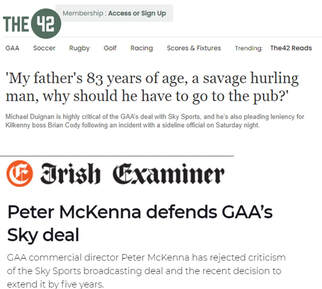
The media headlines to the right of this paragraph give a small flavour of the debate that took place around the sale of broadcast rights to a subscription broadcast service, i.e. Sky. I have used the Michael Duignan quote in the image because he is probably better placed than most to understand the complexity of the issues and the competing interests. As a teenager he arrived in Boston during the summer of 1987 and we played together on a team that won the North American championship. Even at that stage it was possible to watch broadcasts of Irish gaelic games live in a Boston venue. And we handed over dollars for the privilege. By the time of the above quote, Duignan was a respected analyst on the National Broadcaster (RTE) - a broadcaster that "competed" with Sky for access to GAA games. Currently, Duignan is Chairperson of Offaly GAA and was instrumental in securing sponsorship from the golfer Shane Lowry to help the county's finances (here). He has experienced the economic issues from many angles.
It was fascinating to see the variety of responses. Different groups found themselves confronting different circumstances and the solutions varied accordingly. At a national level, the governing body opened up the pay-per-view possibility for supporters/consumers. I have discussed this in a previous post (here). At provincial level (4 provinces within the national level), the decision was made to do something similar with underage championship games. I have discussed this in a previous post (here). There is one important point to note about the broadcasting of these games. It is that in many cases the cameras were already present in the grounds; recording footage to be broadcast as part of TV highlight shows. The technological challenge came in moving the turnstyles online.
Things got a lot more complicated at lower levels. Pre-pandemic only a small number of club games from some counties were broadcast on television. Again, there was the capacity for a small increase in live streaming because of the presence of cameras recording footage for highlights packages. It looks like some enterprising counties arranged their schedules to increase their revenues from these sources. Other counties sought to allocate the broadcasting rights to media organisations. It is only a slight exaggeration to say that arrangements ran into the issues covered in the landmark case involving UEFA's sale of broadcast rights to the Champions League (here). The problems arose with the games that were not sold/broadcast. In both cases, the potential broadcasting/streaming of these games were eventually facilitated.

I wondered what would happen to the cameras and the dongles if/when the spectator restrictions were eased. Others were also reflecting on the experience and the implications for overall GAA broadcasting policy. Paul Rouse outlined these issues in a thought-provoking pieces from last November (here). While Rouse mainly deals with national issues, he also deals with the local issues. Here are his words. "Even before the Covid crisis, there were clubs and organisations in Ireland live-streaming their own sporting events and trying to get people to buy passes on-line. But, as history reveals time and again, one of the things that crises do is to accelerate change that is already underway." Last week, nine months after Rouse's prescient words, a minor local spat broke out between a club and the county organisation (as illustrated in the image below).
How will local sports broadcasting evolve? I don't know but the pandemic has changed attitudes to the possibilities. The change in the attitudes to broadcasting will be important. And it is not just sports broadcasting As I was drafting this blog post I got an email from a colleague who is concerned about the presence of cameras in the teaching space. His concerns are familiar and mirror those in the sporting world. He is concerned about the impact on in-person attendances. He is concerned about his ability to monitise his product (whether from his material being appropriated or his utterances being misconstrued). However, students who were forced to view material online in 2020-21 want the option of access to online material in 2021-22. Many will return to in-person teaching spaces. In my opinion, students will do so more to experience the social side than the learning experience. However, they want the option of viewing the event online - even if it is not live. Something similar already happens with national GAA events. Many spectators will return from the live event to watch the highlights programme on TV (The Sunday Game). Something similar will surely happen with local sporting events.

 RSS Feed
RSS Feed